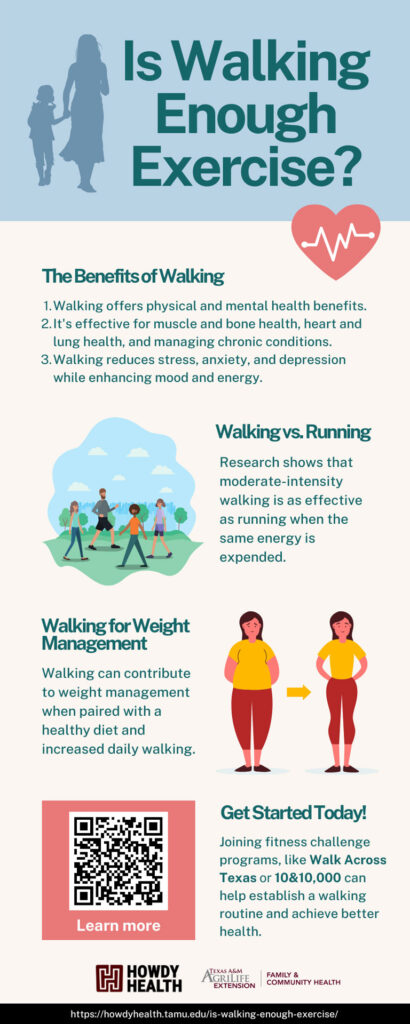If you’re wondering if walking is good exercise, the answer is a resounding YES! Walking is good for both your physical and mental health. It is good for your muscles and bones, as well as your heart and lungs. It can reduce risk and help you manage chronic conditions like high blood pressure, high cholesterol, diabetes, and heart disease.10 It can help relieve stress, anxiety, and depression,1,8 as well as boost your mood and improve your mental alertness, energy,5 and even your creativity!7
Though walking is among the most commonly reported forms of exercise in the U.S.,9 it sometimes gets a bad rap, especially when compared to other forms of exercise, like running. Yet, research has shown that walking at a moderate intensity is just as good as running – as long as you expend the same amount of energy,10 which simply means you may need to keep up your pace and walk a little further than you would run for the same benefit.
What about weight loss?
Weight loss is a complex matter influenced by cultural, psychosocial (i.e., social factors and individual thoughts and behaviors), and biological factors.3 Findings from a meta-analysis (examination of data from multiple studies) suggest that walking is sufficient stimulus to reduce body weight, BMI, and body fat.6 Still, according to Physical Activity and Public Health: Updated Recommendations for Adults from the American College of Sports Medicine and the American Heart Association, “To help prevent unhealthy weight gain, some adults will need to exceed minimum recommended amounts of physical activity to a point that is individually effective in achieving energy balance, while considering their food intake and other factors that affect body weight.”3 In other words, you will likely need to:
- pair walking with a healthy diet,
- walk more minutes a day,4
- consider other patterns of your life and personal make-up that may contribute to weight.
Some exercise is better than nothing
When considering the physical activity we do and how our bodies respond, “Even a little is good; more may be better.”4 Shifting from being sedentary to moving more is very important. Walking for exercise has some amazing health benefits! Walking 30 minutes a day at a moderate intensity is recommended. Exceeding this recommendation, paired with healthy eating, may help more with weight management. Scientists are still discovering the frequency, duration, and intensity of physical activity to best improve health,2,4 but we do know that improving our physical fitness is a strong predictor for reducing chronic disease and premature mortality.2,4
So, let’s get out there and take a walk. Gather a team and join Walk Across Texas or step your way into the Habit of Healthy with one of our other fitness challenge programs!
Infographic
Download the PDF or share the image below to help others learn that walking is a good exercise.
- Anxiety and Depression Association of America. Exercise for stress and anxiety. https://adaa.org/living-with-anxiety/managing-anxiety/exercise-stress-and-anxiety.
- Garber CE, Blissmer B, Deschenes MR, Franklin BA, Lamonte MJ, Lee IM, Nieman DC, Swain DP; American College of Sports Medicine. American College of Sports Medicine position stand. Quantity and quality of exercise for developing and maintaining cardiorespiratory, musculoskeletal, and neuromotor fitness in apparently healthy adults: guidance for prescribing exercise. Med Sci Sports Exerc. 2011 Jul; 43(7): 1334-59. doi: 10.1249/MSS.0b013e318213fefb.
- Haskell WL, Lee IM, Pate RR, Powell KE, Blair SN, Franklin BA, Macera CA, Heath GW, Thompson PD, Bauman A. Physical activity and public health: updated recommendation for adults from the American College of Sports Medicine and the American Heart Association. Med Sci Sports Exerc. 2007 Aug;39(8):1423-34. doi: 10.1249/mss.0b013e3180616b27.
- Lee I. Dose-Response Relation Between Physical Activity and Fitness: Even a Little Is Good; More Is Better. 2007;297(19):2137–2139. doi:10.1001/jama.297.19.2137.
- Mental Health Foundation. Physical health and mental health. 18 Feb 2022. https://www.mentalhealth.org.uk/explore-mental-health/a-z-topics/physical-health-and-mental-health
- Murphy MH, Nevill AM, Murtagh EM, Holder RL. The effect of walking on fitness, fatness and resting blood pressure: A meta-analysis of randomised, controlled trials. Preventive Medicine. 2007;44 (5) :377-385. doi: 10.1016/j.ypmed.2006.12.008.
- Oppezzo M, Schwartz DL. Give your ideas some legs: The positive effect of walking on creative thinking. Journal of Experimental Psychology: Learning, Memory, and Cognition. Vol. 40. (4), Jul, 2014 pp. 1142-1152. doi: 10.1037/a0036577
- Robertson R, Robertson A, Jepson R, Maxwell M. Walking for depression or depressive symptoms: A systematic review and meta-analysis, Mental Health and Physical Activity, Volume 5, Issue 1, June 2012, Pages 66-75, doi: 10.1016/j.mhpa.2012.03.002.
- Tudor-Locke C, Johnson WD, Katzmarzyk PT, Frequently Reported Activities by Intensity for U.S. Adults: The American Time Use Survey, American Journal of Preventive Medicine. 2010 Oct;39(4):e13-e20. doi: 10.1016/j.amepre.2010.05.017.
- Williams PT, Thompson PD. Walking versus running for hypertension, cholesterol, and diabetes mellitus risk reduction. Arterioscler Thromb Vasc Biol. 2013 May;33(5):1085-91. doi: 10.1161/ATVBAHA.





